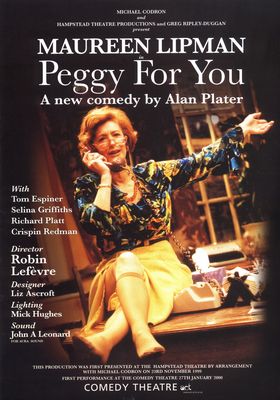PEGGY FOR YOU by Alan
Plater
Venue: Comedy 2000
Directed by Robert Lefevre
Venue: Comedy 2000
Directed by Robert Lefevre

| Peggy | Maureen Lipman |
| Simon | Tom Espiner |
| Tessa | Selina Griffiths |
| Henry | Richard Platt |
| Philip | Crispin Redman |
Review
Curtain Up: Lizzie
Loveridge
Well if you must go whoring in Hollywood, make sure you give good value and get the going rate on the street . . .
The woman who gave this advice to a writer who had been offered the job of writing a screenplay for a Hollywood film is Margaret Ramsay, best known as Peggy. She was a woman with a gift for spotting a good play and fostering new talent and who over several decades represented the best and the brightest British playwrights -- among them Alan Plater who has made her the subject of his new play. What Plater has given us is an attractive, bittersweet comedy, a quick sketch of the essential Peggy Ramsay. It limits itself to a single day's events during the late 1960s when Peggy would have been in her fifties (she died in 1991) and does not compete with Colin Chambers' lengthy Ramsay biography or Simon Callow's book about his passionate but unconsummated relationship with her.
The play's two acts divide into two moods: the first is very funny, with many outrageous pronouncements establishing Ramsay's eccentricities and prejudices; in the second act the laughter quiets down as Plater shows us Ramsay's less attractive qualities. Maureen Lipman, an accomplished comedienne, does not resemble Ramsay physically but gives a striking portrayal. She embodies this eccentric, mercurial and opinionated agent, delivering her often outrageous lines barely pausing for breath. Her advice ranges from Shakespeare references to telling a young writer to write a novel to "get all the fine writing out of your system" explaining that you write a novel for yourself while a play is written for the audience. She addresses Tessa (Selina Griffiths), one in a succession of long suffering secretaries, by the name of the previous secretary. Under Robin LeFèvre's direction, Lipman is all action and energy, whereas the three playwrights who visit her tend to sit still or stand, making them foils for what consequently amounts to a one woman play.
When we first meet Peggy, she has just returned to her office off St Martin's Lane in London's theatreland. With its clutter of books and typed manuscripts and its walls lined with playbills and certificates of play awards, designer Liz Ascroft has given it the look of a place where it would be difficult to find anything. The play begins and ends with Peggy's involvement with one of her playwrights for whom things are not going well. After spending the night at a police station to get him out of jail, she is asleep on the office chaise longue. This sets the scene for the day's events in the busy office, punctuated by the visits of three playwrights.
The first to arrive is Simon (Tom Espiner) an ingenu with tousled hair, denim jacket and numerous badges who has a reading of his play planned that night above a pub in North London. He's somewhat awed by the great lady who gives him a great deal of her time, if not one hundred percent of her attention. (She seems to be doing at least four things at once). The second playwright is the successful Philip (Crispin Redman). He also has an event scheduled for that night, the opening of a an adaptation of Uncle Vanya. Philip has come to take Peggy out to lunch and tell her that he is getting married - for which he won't get any applause from Peggy who believes that wives interfere with the creative process.
Thirdly, there is Henry (Richard Platt), a gruff northerner who won most promising playwright awards some years before but who is now finding it difficult to get work. It is Henry who moves things to the more serious second act when he returns to tell Peggy that he has decided to leave her agency. He openly criticises her for forgetting his latest play. She tries to change his mind, explaining her admitted shortcomings to the fact that it's hard to keep all the manuscripts arriving each day in her head. Henry's announcement is followed by more bad news. It seems that the writer she got released from jail has committed suicide. She sheds no tears, her reaction seeming impassive and unconcerned. As a result the lively, successful woman of act one is revealed a doubly flawed, an agent who tends to neglect of writers who no longer have novelty value and a woman detached from tragedy. She seems not to care neither for Henry or the dead playwright. However as the newspapers phone for a story, Ramsay as ever the agent, gives Henry the job of writing the obituaries. She also opts to spend the evening not with her successful client but going to the reading of Simon's new play.
As I've indicated for a more in-depth understanding of Peggy Ramsay's contribution to the world of stage and screen, you would do best to read the books that have been written about her. But if you want to laugh, there's Peggy For You.